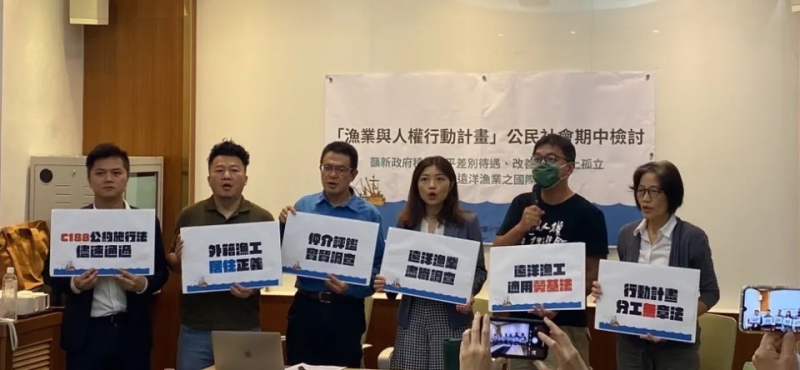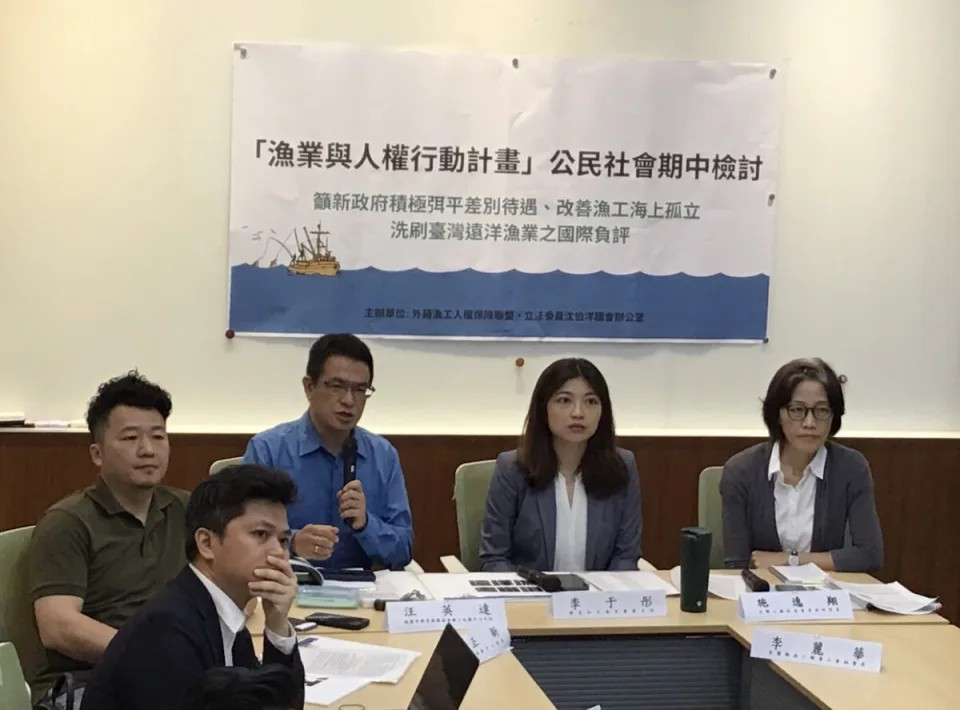
“Implementing Labor Conditions”, “Strengthening Living and Social Security”, and “Enhancing Supervision Mechanism Capacity” are the most underperformed
Taiwan's distant water fisheries have long been criticized internationally for issues related to forced labor and human rights abuses. In May 2022, the Executive Yuan approved a four-year "Plan of Action on Fisheries and Human Rights1" aimed at enhancing the protection of fishermen’s rights. As the plan reaches its two-year mark, the Foreign Fishermen’s Human Rights Alliance (FFHURA), which has long focused on labor and human rights issues in distant water fisheries, held a joint press conference on the "International Day for the Fight of IUU fishing" (June 5th) to review the implementation and effectiveness of the plan. FFHURA found that while the "Plan of Action on Fisheries and Human Rights1" was well-intentioned, its execution has been less than ideal. Among the seven key areas, "implementing labor conditions", "strengthening living conditions and social security", and "enhancing monitoring and management mechanisms" performed the worst. The alliance calls on the newly appointed government and Premier to actively improve and address the frequent forced labor practices in the distant water fisheries, adopting international standards in regulatory practices to fulfill the plan’s original goals.
Lee Lihua, Secretary-General of the Yilan County Fishermen’s Union, stated: “The government’s purpose in creating the action plan should be to demonstrate a strong determination to enforce the law. After passing the National Human Rights Action Plan in May 2022, several sub-plans were subsequently issued, such as the Plan of Action on Fisheries and Human Rights1, the Business and Human Rights Action Plan, and the Anti-Exploitation Action Plan. These action plans require coordinated efforts across departments and practical actions to achieve their goals. Unfortunately, over the past two years, there has been a lack of communication and coordination among government departments, leading to inconsistent and unstructured execution of the plans. The Fisheries Department, which should be responsible for managing fisheries development, has established an internal Fisheries Workforce Group responsible for labor relations guidance, worker education and training, intermediary management, foreign fishermen permits, and inspections, without any legal basis. These tasks should be backed by proper legal authority, but they are only supported by administrative orders issued under the low-level legal framework of the Distant Water Fisheries Act. Additionally, the creation of non-binding and non-enforceable administrative guidelines based on industry demands is problematic. The Ministry of Labor, which should enforce labor laws, has distanced itself, allowing unscrupulous individuals to act with impunity. As a result, fishermen continue to face human rights violations and forced labor, working in exploitative environments akin to legal orphans.”
Shi Yixiang, a senior researcher at the Taiwan Association for Human Rights (TAHR), commented: “While we acknowledge the Taiwanese government's willingness to use this action plan to improve the human rights protection of foreign distant water fishermen, the plan's content reveals the government’s lack of resolve to address the two core structural issues in the industry, namely the discriminatory treatment due to the dual employment system that excludes distant water fishermen from the Labor Standards Act and the Occupational Safety and Health Act, and the need for the government to ratify and implement the ILO C-188 Work in Fishing Convention. Until these structural issues are resolved, Taiwan’s distant water fisheries will continue to pose a high risk of forced labor. The recent Fisheries Agency's draft guidelines on crew communication facilities, suggesting ‘at least 40MB of data or at least three hours of use per month per crew member’, fall significantly short of the fishermen’s actual needs and international practices. For instance, South Korea’s distant water fishing vessels provide at least three hours of Wi-Fi usage daily for all crew members, highlighting the inadequacies of Taiwan’s guidelines in addressing the isolation and forced labor conditions of distant water fishermen.”

Address Discrimination and Improve Fishermen’s Isolation to Rebuild Taiwan’s International Reputation in Distant Water Fisheries.
Li Yutong, Director of the Ocean Program at Greenpeace, pointed out, “Maritime human rights abuses are often related to fishermen being isolated from the outside world, insufficient maritime supervision, and a lack of transparency. However, the action plan fails to fundamentally address these issues. For example, it does not mandate that fishing vessels provide communication networks and allows vessels to stay at sea for up to ten months, exacerbating the isolation of fishermen. CCTV is maintained by vessel operators and the vessel’s movements are not publicly disclosed, increasing the difficulty of public oversight and leaving fishermen outside the social safety net. More urgently, the international community is increasingly imposing legal responsibilities on businesses to uphold human rights, such as the recent European Union’s Corporate Sustainability Due Diligence Directive, which requires companies to identify, prevent, and mitigate human rights violations in their supply chains. For Taiwan’s distant water fisheries to maintain international competitiveness, the industry must accelerate its transformation and ensure that companies fulfill their supply chain due diligence responsibilities to meet market demands.”
Wang Yingda, Director of Migrant Policy at the Taiwan Association for Human Rights, highlighted several severe issues in the implementation of labor conditions: “The discrepancies in the payment methods and timelines are significant, with no regulations leading to potential debts and loans. The frequent transfer and reassignment of distant water fishermen often result in inconsistencies in the Fisheries Agency’s data. Employers commonly retain fishermen’s passports by having them sign commission contracts, which remains a prevalent practice. Regarding intermediary management, key issues include intermediaries often advancing salaries, the reliance on document reviews in intermediary evaluations which may not reflect the actual situation, and intermediaries reopening under different names to evade accountability. The promotion of mutual partnerships lacks impartiality, as the Fisheries Agency often consults with industry stakeholders before communicating with fishermen and human rights groups. Overall, the government has not clearly addressed the discrepancies between forced labor and fair employment practices, nor has it responded to the evidently unreasonable multi-track system in fisheries labor regulations.”
Li Zhengxin, Supervisor at the New Thing Social Service Center, noted, “Whether it’s distant water or coastal fisheries, the labor conditions on fishing vessels largely violate international labor conventions and domestic labor standards. The high-intensity, long-hour work environment at sea is disproportionate to the intermittent short rest periods, making it difficult to calculate overtime and provide appropriate compensation or rest. While CCTV is installed on vessels, the use and protection of this data remain beyond the oversight of government authorities and the public. Improvements to living facilities on fishing vessels and onshore continue to sacrifice the rights of foreign fishermen to live on land. Although onshore accommodations near ports seem to allow fishermen to return to land, the costs and supporting measures fall short of changing the living conditions. The essential concept of separating living and working areas for safety is compromised by the government’s passive approach to improving onshore facilities, misleading both foreign fishermen and the public about their rights to land-based living.”
The midterm review results indicate that the "Plan of Action on Fisheries and Human Rights1" has had significant shortcomings in execution and effectiveness over its two-year implementation. Distant water fisheries, inherently global in nature, face increasing labor rights standards. However, government departments and authorities lag in defining and understanding "forced labor" according to international standards and expectations. The Fishermen’s Alliance stresses that foreign distant water fishermen working on Taiwanese vessels are subjected to inferior labor laws and rights protections. The new government should not operate in isolation but should immediately publish a concrete timeline for the domestic legislation of the C-188 Convention, apply the Labor Standards Act uniformly to all fishermen, mandate the installation of Wi-Fi on all distant water vessels, and require distant water fisheries companies to conduct supply chain due diligence. Addressing these core issues is essential to fundamentally reforming Taiwan’s international human rights image.
〔TAIWAN NEWS / Reporter Wu Shengfeng / Taipei Report〕2024-06-05 12:48
〔photo by Reporter Wu Shengfeng〕
